<Back to Index>
- Physicist and Philosopher Ernst Mach, 1838
- Mathematician and Philosopher Friedrich Ludwig Gottlob Frege, 1848
PAGE SPONSOR
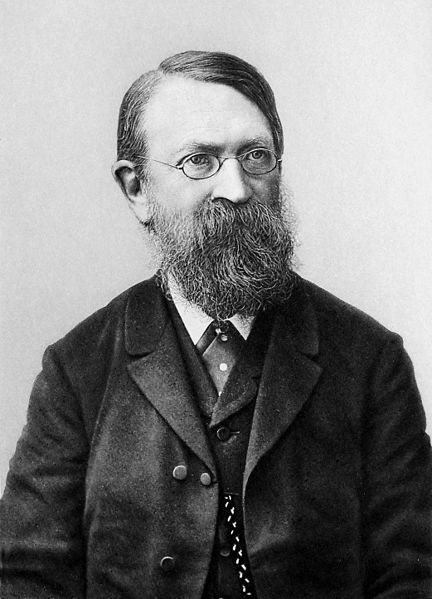
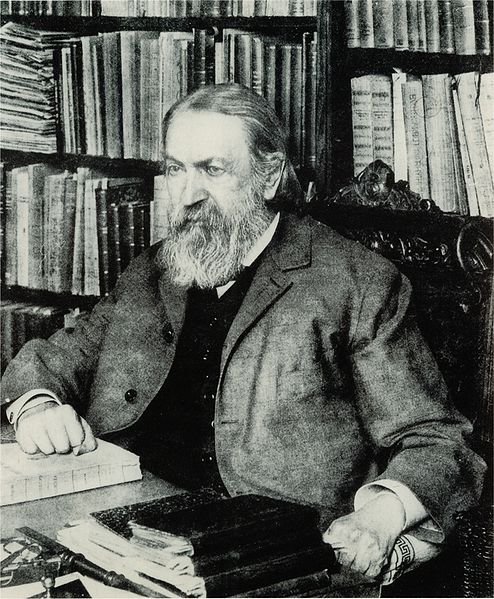
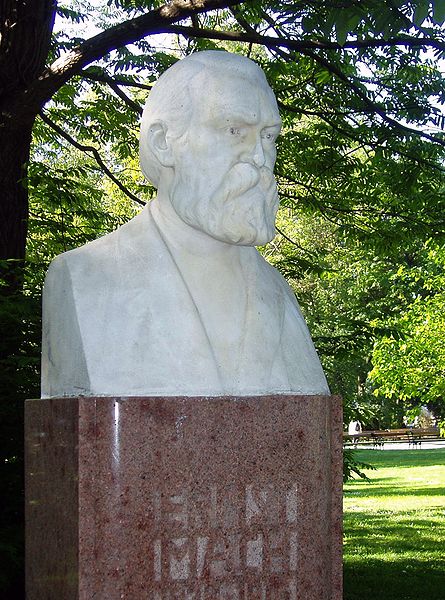
Ernst Mach (February 18, 1838 – February 19, 1916) was an Austrian physicist and philosopher, noted for his contributions to physics such as the Mach number and the study of shock waves. As a philosopher of science, he was a major influence on logical positivism and through his criticism of Newton, a forerunner of Einstein's relativity.
Ernst Waldfried Josef Wenzel Mach was born in Chrlice (German: Chirlitz), Moravia (then in the Austrian empire, now part of Brno in the Czech Republic). His father, who had graduated from Charles University in Prague, acted as tutor to the noble Brethon family in Zlín, eastern Moravia. His grandfather, Wenzl Lanhaus, an administrator of the estate Chirlitz, was also master builder of the streets there. His activities in that field later influenced the theoretical work of Ernst Mach. Some sources give Mach's birthplace as Turas/Tuřany (now also part of Brno), the site of the Chirlitz registry office. Peregrin Weiss baptized Ernst Mach into the Roman Catholic Church in Turas / Tuřany. Despite his Catholic background, he later on became an atheist.
Up to the age of 14, Mach received his education at home from his parents. He then entered a Gymnasium in Kroměříž (German: Kremsier), where he studied for three years. In 1855 he became a student at the University of Vienna. There he studied physics and for one semester medical physiology, receiving his doctorate in physics in 1860 and his Habilitation the following year. His early work focused on the Doppler effect in optics and acoustics. In 1864 he took a job as Professor of Mathematics in Graz, having turned down the position of a chair in surgery at the University of Salzburg to do so, and in 1866 he was appointed as Professor of Physics. During that period, Mach continued his work in psycho - physics and in sensory perception. In 1867, he took the chair of Experimental Physics at the Charles University, Prague, where he stayed for 28 years before returning to Vienna.
Mach's main contribution to physics involved his description and photographs of spark shock waves and then ballistic shock waves. He described how when a bullet or shell moved faster than the speed of sound, it created a compression of air in front it. Using schlieren photography, he and his son Ludwig were able to photograph the shadows of the invisible shock waves. During the early 1890s Ludwig was able to invent an interferometer which allowed for much clearer photographs. But Mach also made many contributions to psychology and physiology, including his anticipation of gestalt phenomena, his discovery of the oblique effect and of Mach bands, an inhibition - influenced type of visual illusion, and especially his discovery of a non - acoustic function of the inner ear which helps control human balance.
Mach also became well known for his philosophy, a type of phenomenalism recognizing only sensations as real. This position seemed incompatible with the view of atoms and molecules as external, mind independent things, and from about 1908 to 1911 Mach's reluctance to acknowledge the reality of atoms was criticized by Max Planck as being incompatible with physics. Some of Mach's criticisms of Newton's position on space and time influenced Einstein, but later Einstein realized that Mach was basically opposed to Newton's philosophy and concluded that his physical criticism was not sound. One of the best known of Mach's ideas is the so-called "Mach principle," concerning the physical origin of inertia. This was never written down by Mach, but was given a graphic verbal form, attributed by Philipp Frank to Mach himself, as, "When the subway jerks, it's the fixed stars that throw you down."
In 1898 Mach suffered from cardiac arrest and in 1901 retired from the University of Vienna and was appointed to the upper chamber of the Austrian parliament. On leaving Vienna in 1913 he moved to his son's home in Vaterstetten, near Munich, where he continued writing and corresponding until his death in 1916. His current living descendant is Marilyn vos Savant (her father was Joseph Mach), the American writer known for her high IQ and her column in Parade Magazine "Ask Marilyn". She has changed her premarital surname and kept it for life because she thinks daughters should take their mother's surnames and keep them after their marriage.
Most of Mach's initial studies in the field of experimental physics concentrated on the interference, diffraction, polarization and refraction of light in different media under external influences. There followed his important explorations in the field of supersonic velocity. Mach's paper on this subject was published in 1877 and correctly describes the sound effects observed during the supersonic motion of a projectile. Mach deduced and experimentally confirmed the existence of a shock wave which has the form of a cone with the projectile at the apex. The ratio of the speed of projectile to the speed of sound vp/vs is now called the Mach number. It plays a crucial role in aerodynamics and hydrodynamics. He also contributed to cosmology the hypothesis known as Mach's principle.
Mach developed a philosophy of science which became influential in the 19th and 20th centuries. He originally saw scientific laws as summaries of experimental events, constructed for the purpose of making complex data comprehensible, but later emphasized mathematical functions as a more useful way to describe sensory appearances. Thus scientific laws while somewhat idealized have more to do with describing sensations than with reality as it exists beyond sensations. Selections are taken from his essay The Economical Nature of Physical Inquiry, excerpted by Kockelmans and slightly corrected by Blackmore.
| “ | The goal which it (physical science) has set itself is the simplest and most economical abstract expression of facts.
When the human mind, with its limited powers, attempts to mirror in itself the rich life of the world, of which it itself is only a small part, and which it can never hope to exhaust, it has every reason for proceeding economically. In reality, the law always contains less than the fact itself, because it does not reproduce the fact as a whole but only in that aspect of it which is important for us, the rest being intentionally or from necessity omitted. |
” |
| “ | In mentally
separating a body from the changeable environment in which it moves,
what we really do is to extricate a group of sensations on which our
thoughts are fastened and which is of relatively greater stability than
the others, from the stream of all our sensations.
Suppose we were to attribute to nature the property of producing like effects in like circumstances; just these like circumstances we should not know how to find. Nature exists once only. Our schematic mental imitation alone produces like events. |
” |
Mach's positivism also influenced many Russian Marxists, such as Alexander Bogdanov (1873 – 1928). In 1908, Lenin wrote a philosophical work, Materialism and Empirio - Criticism (published 1909), in which he criticized Machism and the views of "Russian Machists".
In accordance with this philosophy, Mach opposed Ludwig Boltzmann and others who proposed an atomic theory of physics. Since one cannot observe things as small as atoms directly, and since no atomic model at the time was consistent, the atomic hypothesis seemed to Mach to be unwarranted, and perhaps not sufficiently "economical". Mach had a direct influence on the Vienna Circle philosophers and the school of logical positivism in general.
Mach is attributed with a number of principles that distill his ideal of physical theorization — what is now called "Machian physics":
- It should be based entirely on directly observable phenomena (in line with his positivistic leanings);
- It should completely eschew absolute space and time in favor of relative motion;
- Any phenomena that would seem attributable to absolute space and time (e.g. inertia and centrifugal force) should instead be seen as emerging from the large scale distribution of matter in the universe.
The last is singled out, particularly by Albert Einstein as "the" Mach's principle. Einstein cited it as one of the three principles underlying general relativity. In 1930, he stated that "it is justified to consider Mach as the precursor of the general theory of relativity", though Mach, before his death, would reject Einstein's theory. Einstein was aware that his theories did not fulfill all Mach's principles, and no subsequent theory has either, despite considerable effort.
In 1873, independently of each other Mach and the physiologist and physician Josef Breuer discovered how the sense of balance (i.e., the perception of the head’s imbalance) functions, tracing its management by information which the brain receives from the movement of a fluid in the semicircular canals of the inner ear. That the sense of balance depended on the three semicircular canals was discovered in 1870 by the physiologist Friedrich Goltz, but Goltz did not discover how the balance - sensing apparatus functioned.
In the area of sensory perception, psychologists remember Mach for the optical illusion called the Mach band.
More clearly than anyone before (or even since) Mach made the distinction between what he called physiological (specifically visual) and geometrical spaces.
Mach's views on mediating structures inspired B.F. Skinner's strongly inductive position, which paralleled Mach's in the field of psychology.
The lunar crater Mach takes its name from Ernst Mach. So does the visual illusion and the unit for the velocity of sound.

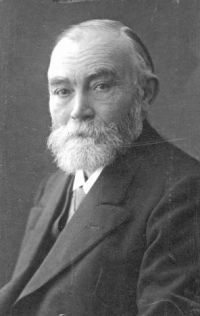
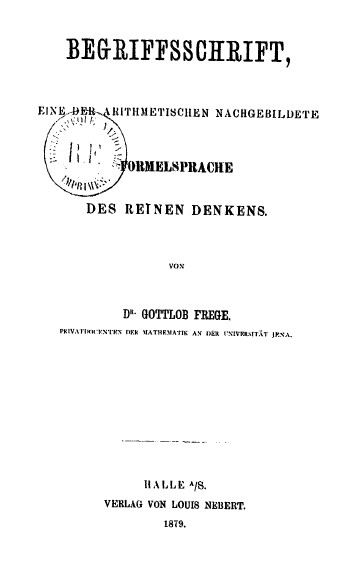
Friedrich Ludwig Gottlob Frege (8 November 1848 – 26 July 1925) was a German mathematician, logician and philosopher. He is considered to be one of the founders of modern logic and made major contributions to the foundations of mathematics. He is generally considered to be the father of analytic philosophy, for his writings on the philosophy of language and mathematics. While he was mainly ignored by the intellectual world when he published his writings, Giuseppe Peano (1858 – 1932) and Bertrand Russell (1872 – 1970) introduced his work to later generations of logicians and philosophers.
Frege was born in 1848 in Wismar, in the state of Mecklenburg - Schwerin (the modern German federal state Mecklenburg - Vorpommern). His father Carl (Karl) Alexander Frege (3 August 1809 – 30 November 1866) was the co-founder and headmaster of a girls' high school until his death. After Carl's death, the school was led by Frege's mother Auguste Wilhelmine Sophie Frege (née Bialloblotzky, 12 January 1815 – 14 October 1898).
In childhood, Frege encountered philosophies that would guide his future scientific career. For example, his father wrote a textbook on the German language for children aged 9–13, entitled Hülfsbuch zum Unterrichte in der deutschen Sprache für Kinder von 9 bis 13 Jahren (2nd ed., Wismar, 1850; 3rd ed., Wismar and Ludwigslust: Hinstorff, 1862), the first section of which dealt with the structure and logic of language.
Frege studied at a gymnasium in Wismar and graduated in 1869. His teacher Gustav Adolf Leo Sachse (5 November 1843 – 1 September 1909), who was also a poet, played the most important role in determining Frege's future scientific career, encouraging him to continue his studies at the University of Jena.
Frege matriculated at the University of Jena in the spring of 1869 as a citizen of the North German Federation. In the four semesters of his studies he attended approximately twenty courses of lectures, most of them on mathematics and physics. His most important teacher was Ernst Karl Abbe (1840 – 1905) (physicist, mathematician and inventor). Abbe gave lectures on theory of gravity galvanism and electrodynamics, complex analysis theory of functions of a complex variable, applications of physics, selected divisions of mechanics and mechanics of solids. Abbe was more than a teacher to Frege: he was a trusted friend, and, as director of the optical manufacturer Carl Zeiss AG, he was in a position to advance Frege's career. After Frege's graduation, they came into closer correspondence.
His other notable university teachers were Christian Philipp Karl Snell (1806 – 1886) (subjects: use of infinitesimal analysis in geometry analytical geometry of planes, analytical mechanics, optics, physical foundations of mechanics); Hermann Karl Julius Traugott Schaeffer (1824 – 1900) (analytical geometry, applied physics, algebraic analysis, on the telegraph and other electronic machines); and the famous philosopher Kuno Fischer (1824 – 1907) (Kantian and critical philosophy).
Starting in 1871, Frege continued his studies in Göttingen, the leading university in mathematics in German speaking territories, where he attended the lectures of Alfred Clebsch (1833 – 1872) (analytical geometry), Ernst Christian Julius Schering (1824 – 1897) function theory, Wilhelm Eduard Weber (1804 – 1891) (physical studies, applied physics, Eduard Riecke (1845 – 1915) (theory of electricity, and Hermann Lotze (1817 – 1881) (philosophy of religion). (Many of the philosophical doctrines of the mature Frege have parallels in Lotze; it has been the subject of scholarly debate whether or not there was a direct influence on Frege's views arising from his attending Lotze's lectures.)
In 1873, Frege attained his doctorate under Ernst Schering, with a dissertation under the title of "Über eine geometrische Darstellung der imaginären Gebilde in der Ebene" ("On a Geometrical Representation of Imaginary Forms in a Plane"), in which he aimed to solve such fundamental problems in geometry as the mathematical interpretation of projective geometry's infinitely distant (imaginary) points.
Frege married Margarete Katharina Sophia Anna Lieseberg (15 February 1856 - 25 June 1904) on March 14, 1887.
Though his education and early work were mathematical, especially geometrical, Frege's thought soon turned to logic. His Begriffsschrift, eine der arithmetischen nachgebildete Formelsprache des reinen Denkens (Halle a/S: Verlag von Louis Nebert, 1879) (Concept - Script: A Formal Language for Pure Thought Modeled on that of Arithmetic) marked a turning point in the history of logic. The Begriffsschrift broke new ground, including a rigorous treatment of the ideas of functions and variables. Frege wanted to show that mathematics grows out of logic, but in so doing, he devised techniques that took him far beyond the Aristotelian syllogistic and Stoic propositional logic that had come down to him in the logical tradition.
In effect, Frege invented axiomatic predicate logic, in large part thanks to his invention of quantified variables, which eventually became ubiquitous in mathematics and logic, and which solved the problem of multiple generality. Previous logic had dealt with the logical constants and, or, if ... then ..., not, and some and all, but iterations of these operations, especially "some" and "all", were little understood: even the distinction between a pair of sentences like "every boy loves some girl" and "some girl is loved by every boy" was able to be represented only very artificially, whereas Frege's formalism had no difficulty expressing the different readings of "every boy loves some girl who loves some boy who loves some girl" and similar sentences, in complete parallel with his treatment of, say, "every boy is foolish".
It is frequently noted that Aristotle's logic is unable to represent even the most elementary inferences in Euclid's geometry, but Frege's "conceptual notation" can represent inferences involving indefinitely complex mathematical statements. The analysis of logical concepts and the machinery of formalization that is essential to Principia Mathematica (3 vols., 1910 – 1913) (by Bertrand Russell, 1872 – 1970, and Alfred North Whitehead, 1861 – 1947), to Russell's theory of descriptions, to Kurt Gödel's (1906 – 1978) incompleteness theorems, and to Alfred Tarski's (1901 – 1983) theory of truth, is ultimately due to Frege.
One of Frege's stated purposes was to isolate genuinely logical principles of inference, so that in the proper representation of mathematical proof, one would at no point appeal to "intuition". If there was an intuitive element, it was to be isolated and represented separately as an axiom: from there on, the proof was to be purely logical and without gaps. Having exhibited this possibility, Frege's larger purpose was to defend the view that arithmetic is a branch of logic, a view known as logicism: unlike geometry, arithmetic was to be shown to have no basis in "intuition", and no need for non - logical axioms. Already in the 1879 Begriffsschrift important preliminary theorems, for example a generalized form of law of trichotomy, were derived within what Frege understood to be pure logic.
This idea was formulated in non - symbolic terms in his Die Grundlagen der Arithmetik (1884) (The Foundations of Arithmetic). Later, in his Grundgesetze der Arithmetik (Basic Laws of Arithmetic) (vol. 1, 1893; vol. 2, 1903) (vol. 2 of which was published at his own expense), Frege attempted to derive, by use of his symbolism, all of the laws of arithmetic from axioms he asserted as logical. Most of these axioms were carried over from his Begriffsschrift, though not without some significant changes. The one truly new principle was one he called the Basic Law V: the "value - range" of the function f(x) is the same as the "value - range" of the function g(x) if and only if ∀x[f(x) = g(x)].
The crucial case of the law may be formulated in modern notation as follows. Let {x|Fx} denote the extension of the predicate Fx, i.e., the set of all Fs, and similarly for Gx. Then Basic Law V says that the predicates Fx and Gx have the same extension iff ∀x[Fx ↔ Gx]. The set of Fs is the same as the set of Gs just in case every F is a G and every G is an F. (The case is special because what is here being called the extension of a predicate, or a set, is only one type of "value - range" of a function.)
In a famous episode, Bertrand Russell wrote to Frege, just as Vol. 2 of the Grundgesetze was about to go to press in 1903, showing that Russell's paradox could be derived from Frege's Basic Law V. It is easy to define the relation of membership of a set or extension in Frege's system; Russell then drew attention to "the set of things x that are such that x is not a member of x". The system of the Grundgesetze entails that the set thus characterized both is and is not a member of itself, and is thus inconsistent. Frege wrote a hasty, last minute Appendix to Vol. 2, deriving the contradiction and proposing to eliminate it by modifying Basic Law V. Frege opened the Appendix with the exceptionally honest comment: "Hardly anything more unfortunate can befall a scientific writer than to have one of the foundations of his edifice shaken after the work is finished. This was the position I was placed in by a letter of Mr. Bertrand Russell, just when the printing of this volume was nearing its completion." (This letter and Frege's reply are translated in Jean van Heijenoort 1967.)
Frege's proposed remedy was subsequently shown to imply that there is but one object in the universe of discourse, and hence is worthless (indeed, this would make for a contradiction in Frege's system if he had axiomatized the idea, fundamental to his discussion, that the True and the False are distinct objects; see, for example, Dummett 1973), but recent work has shown that much of the program of the Grundgesetze might be salvaged in other ways:
- Basic Law V can be weakened in other ways. The best known way is due to philosopher and mathematical logician George Boolos (1940 – 1996), who was an expert on the work of Frege. A "concept" F is "small" if the objects falling under F cannot be put into one-to-one correspondence with the universe of discourse, that is, if: ∃R[R is 1-to-1 & ∀x∃y(xRy & Fy)]. Now weaken V to V*: a "concept" F and a "concept" G have the same "extension" if and only if neither F nor G is small or ∀x(Fx ↔ Gx). V* is consistent if second order arithmetic is, and suffices to prove the axioms of second order arithmetic.
- Basic Law V can simply be replaced with Hume's Principle, which says that the number of Fs is the same as the number of Gs if and only if the Fs can be put into a one-to-one correspondence with the Gs. This principle, too, is consistent if second order arithmetic is, and suffices to prove the axioms of second order arithmetic. This result is termed Frege's Theorem because it was noticed that in developing arithmetic, Frege's use of Basic Law V is restricted to a proof of Hume's Principle; it is from this, in turn, that arithmetical principles are derived.
- Frege's logic, now known as second order logic, can be weakened to so-called predicative second order logic. Predicative second order logic plus Basic Law V is provably consistent by finitistic or constructive methods, but it can interpret only very weak fragments of arithmetic.
Frege's work in logic had little international attention until 1903 when Russell wrote an appendix to The Principles of Mathematics stating his differences with Frege. The diagrammatic notation that Frege used had no antecedents (and has had no imitators since). Moreover, until Russell and Whitehead's Principia Mathematica (3 vols.) appeared in 1910 – 13, the dominant approach to mathematical logic was still that of George Boole (1815 – 1864) and his intellectual descendants, especially Ernst Schröder (1841 – 1902). Frege's logical ideas nevertheless spread through the writings of his student Rudolf Carnap (1891 – 1970) and other admirers, particularly Bertrand Russell and Ludwig Wittgenstein (1889 – 1951).
Frege is one of the founders of analytic philosophy, mainly because of his contributions to the philosophy of language, including the
- Function - argument analysis of the proposition;
- Distinction between concept and object (Begriff und Gegenstand);
- Principle of compositionality;
- Context principle;
- Distinction between the sense and reference (Sinn und Bedeutung) of names and other expressions, sometimes said to involve a mediated reference theory.
As a philosopher of mathematics, Frege attacked the psychologistic appeal to mental explanations of the content of judgment of the meaning of sentences. His original purpose was very far from answering general questions about meaning; instead, he devised his logic to explore the foundations of arithmetic, undertaking to answer questions such as "What is a number?" or "What objects do number - words ("one", "two", etc.) refer to?" But in pursuing these matters, he eventually found himself analyzing and explaining what meaning is, and thus came to several conclusions that proved highly consequential for the subsequent course of analytic philosophy and the philosophy of language.
It should be kept in mind that Frege was employed as a mathematician, not a philosopher, and he published his philosophical papers in scholarly journals that often were hard to access outside of the German speaking world. He never published a philosophical monograph other than The Foundations of Arithmetic, much of which was mathematical in content, and the first collections of his writings appeared only after World War II. A volume of English translations of Frege's philosophical essays first appeared in 1952, edited by students of Wittgenstein, Peter Geach (born 1916) and Max Black (1909 – 1988), with the bibliographic assistance of Wittgenstein (see Geach, ed. 1975, Introduction). Despite the generous praise of Russell and Wittgenstein, Frege was little known as a philosopher during his lifetime. His ideas spread chiefly through those he influenced, such as Russell, Wittgenstein and Carnap, and through work on logic and semantics by Polish logicians.
The distinction between Sinn ("sense") and Bedeutung (usually translated "reference", but also as "meaning" or "denotation") was an innovation of Frege in his 1892 paper "Über Sinn und Bedeutung" ("On Sense and Reference"). According to Frege, sense and reference are two different aspects of the significance of an expression. Frege applied Bedeutung in the first instance to proper names, where it means the bearer of the name, the object in question, but then also to other expressions, including complete sentences, which bedeuten the two "truth values", the true and the false; by contrast, the sense or Sinn associated with a complete sentence is the thought it expresses. The sense of an expression is said to be the "mode of presentation" of the item referred to.
The distinction can be illustrated thus: In their ordinary uses, the name "Charles Philip Arthur George Mountbatten - Windsor", which for logical purposes is an unanalyzable whole, and the functional expression "the Prince of Wales", which contains the significant parts "the prince of ξ" and "Wales", have the same reference, namely, the person best known as Prince Charles. But the sense of the word "Wales" is a part of the sense of the latter expression, but no part of the sense of the "full name" of Prince Charles.
These distinctions were disputed by Bertrand Russell, especially in his paper "On Denoting"; the controversy has continued into the present, fueled especially by Saul Kripke's famous lectures "Naming and Necessity".
Imagine the road signs outside a city. They all point to (bedeuten) the same object (the city), although the "mode of presentation" or sense (Sinn) of each sign (its direction or distance) is different. Similarly "the Prince of Wales" and "Charles Philip Arthur George Mountbatten-Windsor" both denote (bedeuten) the same object, though each uses a different "mode of presentation" (sense or Sinn).
Frege's published philosophical writings were of a very technical nature and divorced from practical issues, so much so that Frege scholar Dummett expresses his "shock to discover, while reading Frege's diary, that his hero was an outspoken anti - Semite (1973)." He was always a conservative, but after World War I he became more of a radical. His late political "diary shows Frege to have been a man of extreme right wing political opinions, bitterly opposed to the parliamentary system, democrats, liberals, Catholics, the French and, above all, Jews, who he thought ought to be deprived of political rights and, preferably, expelled from Germany". Frege confided "that he had once thought of himself as a liberal and was an admirer of Bismarck, but his heroes now were General Ludendorff and Adolf Hitler. This was after the two had tried to topple the elected democratic government in a coup in November 1923. In his diary Frege also used all his analytic skills to devise plans for expelling the Jews from Germany and for suppressing the Social Democrats." Frege disliked universal suffrage and was against any form of socialism, which he simply called Marxism. His antisemitism still allowed for exceptions, and he had friendly relations with Jews in real life: among his students was Gershom Scholem who much valued his teacher; and he encouraged Ludwig Wittgenstein to leave for England. The 1924 diary has been published.
Frege was described by his students as a highly introverted person, seldom entering into dialogue, mostly facing the blackboard while lecturing though being witty and sometimes bitterly sarcastic.
- Born 8 November 1848 in Wismar, Mecklenburg - Schwerin.
- 1869 — attends the University of Jena.
- 1871 — attends the University of Göttingen.
- 1873 — PhD, doctor in mathematics (geometry), attained at Göttingen.
- 1874 — Habilitation at Jena; private teacher.
- 1879 — Professor Extraordinarius at Jena.
- 1896 — Ordentlicher Honorarprofessor at Jena.
- 1917 or 1918 — retires.
- Died 26 July 1925 in Bad Kleinen (now part of Mecklenburg - Vorpommern).